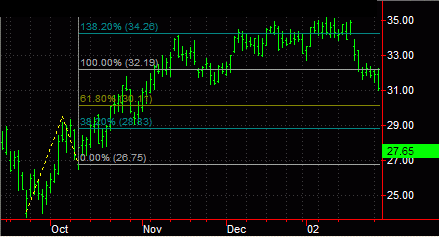TradeStation Help
Fibonacci Price Extension Lines Drawing Object
Fibonacci Price Extension Lines are an analytical drawing tool that is similar to the Fibonacci Retracement (Support/Resistance) tool, except that the Trend-based Price Line tool requires a third point and is calculated from the retracement point. This tool is used to monitor and levels as well as breakout price activity from a specified retracement level. support indicates a low or series of troughs where price activity has not penetrated. resistance indicates a high or series of peaks where price activity has not penetrated. identifying and monitoring these two levels can assist in determining whether a market will stay on course or reverse its course. penetration through a support line or resistance line may indicate a market . support and resistance lines can also be used in conjunction with Percent Retracement analysis to identify past trend correction patterns. These patterns can then assist in predicting future patterns.

You can also use the menu for a selected object component (identified with small squares) to change the drawing properties such as color, style, weight, and any object specific settings.
Drawing Fibonacci Price Extension Lines Object
Drawing objects are applied to a chart to assist with data analysis. See About Drawing Objects for more details.
- Activate a Chart Analysis window.
- From the Drawing toolbar, select Fibonacci Price Extension Lines
 icon. Your pointer will change to the shape of Price Extension Lines.
icon. Your pointer will change to the shape of Price Extension Lines.
- Click where you want to insert the Price Extension Lines and drag your pointer to the left or right to position the drawing object.
- Click where you want the Price Extension Lines to begin.
- Move the pointer up, down, left, or right to position the Price Extension Lines, then click again to insert.
Moving a Fibonacci Price Extension Lines Object
After a Fibonacci Cycles is applied to a chart, you can reposition the drawing object at any time to evaluate another group of bars.
- Activate a Chart Analysis window containing a Fibonacci Price Extension Lines object.
- To move a Fibonacci Cycles, select the Fibonacci Fixed-based Time Lines (small squares in the middle of each Fibonacci line confirms the drawing object is selected.
- Drag horizontally to reposition.
Formatting Fibonacci Price Extension Lines Settings
The format settings for Price and Time Extension lines are similar except that Price Extension Lines are horizontal while Time Extension Lines are vertical. Both types of lines are based on price or time extensions of an underlying trend line and relative levels of support/resistance for Price Lines and time/date for Time Lines. The Settings tab is used to modify settings for the extension lines by specifying their percentage as well as other properties.
- Activate a Chart Analysis window containing a Fibonacci Price/Time Extension Lines object.
- Select the Fibonacci Price/Time Extension Lines object.
- Right-click to select the Format 'Fibonacci Price Extension Lines'. The Format Fibonacci Price Extension Lines dialog is displayed.
- Click the Settings tab.
- Under Percentage, select a check box to enable the display of the Major Trend, Retracement, Base, and each parallel horizontal price line.
- Enter a percentage, in decimal format, in the box corresponding to the selected check box. This value determines at what point a support/resistance line intersects the underlying trendline from a base retracement level.
- In the drop down lists, select a Line Color, Line Style, and Line Weight for each segment.
- Selecting the Use the following color, style and weight for all lines check box will allow the matching properties to be used for all lines. The individual line properties will become unavailable (grayed out).
- Select the Set as Default check box to use these settings as the default for all future support/resistance lines.
- Click OK.
You can also use the menu for a selected object to change available settings.
Related Topics
Formatting the Alerts of a Drawing Object
Formatting the Labels of a Drawing Object
Formatting the Data of a Drawing Object

